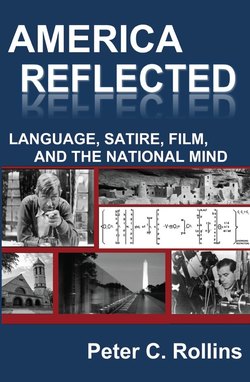America Reflected: Language, Satire, Film, and the National Mind

Реклама. ООО «ЛитРес», ИНН: 7719571260.
Оглавление
Peter C. Rollins. America Reflected: Language, Satire, Film, and the National Mind
Foreword
Preface
Acknowledgments
Introduction
Part I: America Reflected in Satire, Language, and Film. Will Rogers’ Popular Culture. 1. The Evolving Persona of Will Rogers: Symbolic Man, Journalist, and Film Image
2. Will Rogers and The Saturday Evening Post: Kindred Spirits?
3. The Context and Rhetorical Strategy of Will Rogers’ Letters of a Self-Made Diplomat to His President (1926)
4. Will Rogers on Aviation: A Means of Fostering Frontier Values in an Age of Machines and Bunk?
5. Regional Literature and Will Rogers: Film Redeems a Literary Form
6. The Making of Will Rogers’ 1920s: A Cowboy’s Guide to the Times: An Experiment in Historian Filmmaking
Benjamin Whorf on the Native American vs. Western Languages/Cultures. 7. Benjamin Lee Whorf: Transcendental Linguist
8. The Sapir-Whorf Relationship Reconsidered
9. The Whorf Hypothesis as a Critique of Western Science and Technology
Part II: America’s Wars: Film Images and Historical Realities. World War I. 10. Memories of War: Was World War I a Heroic Crusade or a Traumatic Nightmare?
11. Parallels or Continuities in Two Historical Compilation Films: Goodbye Billy and The Frozen War
World War II. 12. Frank Capra’s Why We Fight Series and Our American Dream
13. Remembering D-Day: Perspective from the Fiftieth Anniversary
14. Storm of Fire: Reflections on Cadre Films and the Historian as Filmmaker
Cold War. 15. Victory at Sea: Cold War Epic
16. Nightmare in Red: A Cold War View of the Communist Revolution
Vietnam. 17. Using Popular Culture to Study the Vietnam War: Perils and Possibilities
18. Television’s Vietnam: The Impact of Visual Images
19. Press History Repeating Itself as Farce?: Critical Responses to Television’s Vietnam: The Real Story (1985)
20. Behind the Westmoreland Trial of 1984: What Was so Wrong with the CBS Program, The Uncounted Enemy (1982)
21. The Uncounted Expert: George Carver’s Views on Intelligence “Deception” Reported by CBS in The Uncounted Enemy: A Vietnam Deception (1982)
22. Neil Sheehan’s Bright Shining Lie: The Story of John Paul Vann or of America’s New Media Elite?
23. Dear America (HBO 1988): Oral History as Interpretation of the Vietnam Experience?
24. Para dismentir “television’s vietnam”: Los motivos de un Documentarista
25. Teaching International Politics: What the Historian-Filmmaker Has to Offer
Part III: American Cultural Figures, Movements, Classics. 26. Uncle Tom’s Cabin (1852): Harriet Beecher Stowe’s Declaration of Independence from Calvinism
27. Frederick Henry Hedge: Brookline’s Conservative Transcendentalist
28. Amy Lowell of Brookline: The Patterns of a Life
29. John James Audubon: The ‘American Woodsman’?
30. Ideology and Film Rhetoric: Three Documentaries of the New Deal Era (1936-1941)
31. Tulsa (1949) as an Oil Field Film: A Study of Ecological Ambivalence
Photo Credits
Отрывок из книги
by Michael T. Marsden
It is undeniable that popular culture has emerged world-wide as a legitimate field of study. But certainly that was not the case when I entered graduate school more than four decades ago. Nor was it so when Peter Rollins returned from the battleground of Vietnam to complete his graduate work.
.....
Of lesser intellectual content, but of greater public exposure was another HBO production entitled Dear America: Letters Home from Vietnam (1987). Ostensibly based on an eponymous anthology, director Bill Couturie tapped the power of music and montage to convey a message quite different from that of Bernard Edelman’s anthology of letters from New York soldiers to their families. While the book emphasized themes of courage and suffering, the film evoked a Vietnam that was a brutal, demoralizing conflict of no redeeming value—one which demolished the country in which we fought while corrupting the young soldiers and marines sent to prosecute a misguided strategy (Chapter 23). For negativity, the program is exceeded only by Peter Davis’ Hearts and Minds, an Academy-Award winning compilation film praised by the North Vietnam government in a telegram read by the film’s producer at the 1974 Academy Award ceremony (Chapter 17). There are both ideological and formal (i.e., film as an art form) elements which “determined” a special formula for portraying the war and the veterans who survived it; discerning viewers need to anticipate this pattern. Chapter 17 outlines this formula and contrasts the results in film with a 1980 Harris poll of veteran attitudes. Most readers will be surprised to learn that over 80% of our troops believed, some five years after the fall of South Vietnam, that they had done the right thing by defending the South Vietnamese from Communist conquest. No credibility gap could be larger than the abyss between the Hollywood version and the experience and memories of American service men and women who served. For twenty years, I tried to uphold their perspective and memory, an effort not without difficulty in Academe.
Other Figures and National Myths and the Film Record
.....